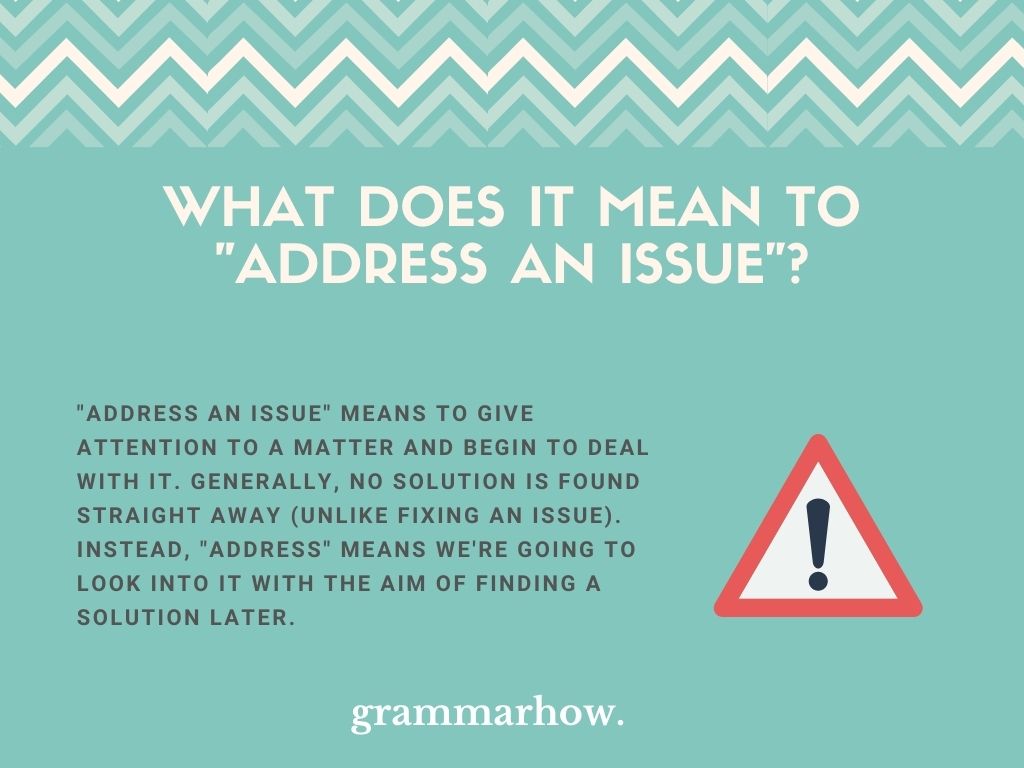The phrase “address an issue” is fairly common in formal speech and writing. You might hear a politician or employer talking about “addressing an issue.” This article will talk about what it means and how it differs from fixing one.
What Does It Mean To “Address An Issue”?
“Address an issue” means to give attention to a matter and begin to deal with it. Generally, no solution is found straight away (unlike fixing an issue). Instead, “address” means we’re going to look into it with the aim of finding a solution later.

The definition of “address,” according to The Cambridge Dictionary, is”to give attention to or deal with a matter or problem.” When talking about “addressing an issue,” we’re using “address” in the verb form.
To address an issue, you may find yourself (or someone else) doing one of the following:
- Talking to anyone involved in the issue
- Doing research to get to the bottom of it
- Let people know that you’re working on a solution for the issue
- Find a fault and troubleshoot reasons why it may have occurred.
How you address the issue is dependent on the context. However, the idea is always that you’re bringing your attention to the issue rather than solving it straight away.
Examples Of How To Use “Address An Issue” In A Sentence
To help you understand the phrase slightly better, we’ll include some examples to show you when it works best and when you can use it.
- We need to address this issue before we’re able to move on to the next phase.
- Let’s work together to address an issue before the boss gets mad about it!
- I think it’s time we try to address the issue. The sooner we figure it out, the better.
- I’m here to address the issue of climate change, though I’m going to need your help finding my answers.
- They should start addressing issues that actually matter to us rather than fluff ones that no one cares about!
As you can see, “address an issue” is used when we want to start working on solving a problem. We typically give people notice or a time frame to solve an issue, and it’s important to differentiate that we’re not looking for an ultimate fix straight away.
What Is The Difference Between Addressing An Issue And Fixing An Issue?
“Addressing an issue” talks about starting to develop ideas to help solve the issue. There is no definitive outcome or solution yet. “Fixing an issue” is what we do when we’ve completed and solved the issue at hand.
“Addressing an issue” means there’s plenty more work that needs to be done before we find a solution, while “fixing an issue” means we’ve solved the issue, and there’s no more that needs to be done on that front.
The different verb forms we use here play a key part in the meaning of our phrase. If we make sure we’re using the right verb form, we’ll always use it correctly.
- I have fixed the issue regarding your router.
- I have started addressing the issue you asked me to.
Sometimes, we might say “fix an issue” before we’ve come to a solution. That’s because we are determined to get to the solution and know that it’s feasible and possible to do so.
- Let’s fix the issue with the cables before it gets dark.
- I’m going to fix the issue for you.
While the solution isn’t yet guaranteed, the idea is that we’re working towards that solution and won’t stop the task or job until we’ve completed it.
“Address the issue” in this sense still only means that we’re going to look into the issue and not that we’re going to solve it.
- Let’s address the issue with the cables.
This means we’ll work on the issues, but we don’t have any plans to solve them; we simply want to know what we’re working with.
Address An Issue – Synonyms
Finally, let’s go over some synonyms you can use in place of “address an issue.”
- Discuss an issue
- Talk about an issue
- Handle an issue
- Negotiate
- Manage an issue
These synonyms all offer a way to start looking into an issue without a solution straight away.
You may also like: “Address A Question” Meaning (And How It Differs From Answering)

Martin holds a Master’s degree in Finance and International Business. He has six years of experience in professional communication with clients, executives, and colleagues. Furthermore, he has teaching experience from Aarhus University. Martin has been featured as an expert in communication and teaching on Forbes and Shopify. Read more about Martin here.
